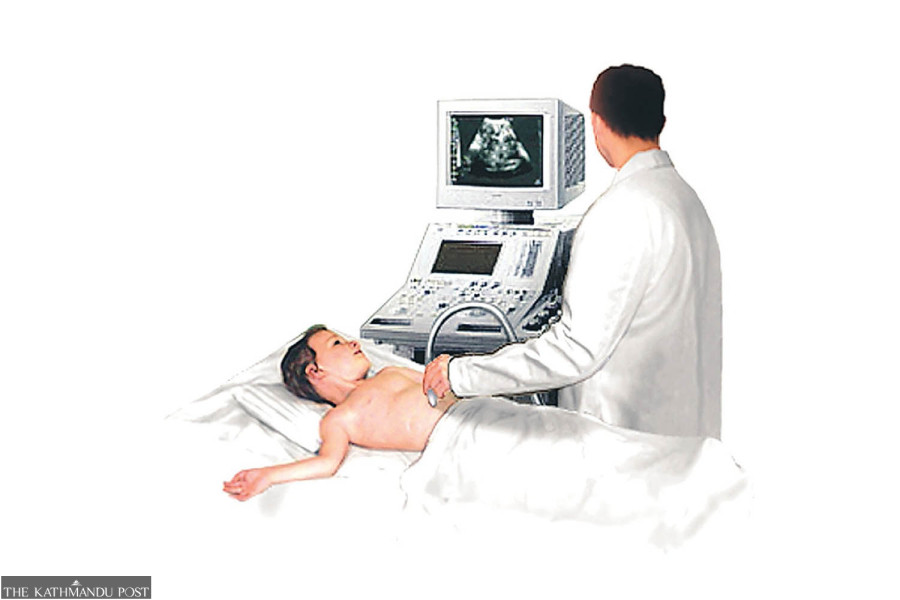Health
KMC offers free ultrasound
The city office has hired 108 staff, including physiotherapists, radiographers, lab technicians, and nurses. It has also started health campaigns in 32 wards.
Post Report
The Kathmandu Metropolitan City has started providing ultrasound services free of cost to needy patients from its urban health promotion centres.
Officials at the health department of the city office said that 10 out of 32 urban health promotion centres have already started providing services, and an additional five will also start the services within a month.
“Any patient from any part of the country, if they are in Kathmandu metropolis, can receive the service,” said Deepak Kumar KC, chief of the health department of the metropolis. “We do not charge anyone any amount.”
KMC officials said that ultrasound is a free basic health service the city office is committed to providing. However, patients must pay at least Rs400 for the services in the big hospitals and private clinics and hospitals charge additional amounts.
Doctors recommend patients an ultrasound for various diagnoses, including finding the cause of pain and swelling, monitoring the growth and development of the fetus, and looking for blockages, among others.
Officials say patients can bring prescriptions from other hospitals or doctors at urban health promotion centres for services.
Along with ultrasound service, the city office has been providing physiotherapy services free of cost from all its 32 urban health promotion centres.
The metropolis has also been working on setting up laboratories in all of its 32 urban health promotion centres.
KC said that due to the lack of laboratory services in most urban health clinics, patients have been forced to seek services at state-run hospitals and private centres, which are often overcrowded and expensive. According to him, lab services will also be free to the patients.
The city office runs 32 urban health promotion centres, one in each ward of the metropolis. The metropolis had recently opened vacancies to hire 108 staffers, including 32 physiotherapists, 29 lab technicians, four medical officers, five staff nurses, 10 radiographers, 10 pharmacy assistants, and 26 peons for the urban health clinics.
The city office provides 98 types of essential medicines—for communicable and non-communicable diseases, including high blood pressure, diabetes, mental health, heart disease, asthma, cholesterol, and respiratory problems—free of cost.
Patients with government health insurance can get over 300 types of medicines from urban health clinics, according to health officials.
Earlier, KMC provided mental health screening training to doctors and paramedics at urban health promotion centres. Officials hoped the move would help hundreds of mental health patients in the city get timely treatment.
Officials say that they are also planning to provide free medication to patients with mental health problems.
Although neither the federal government agency nor the city office has data on the number of people suffering from mental health problems in the metropolis, doctors estimated that many residents could be suffering from various forms of mental health problems including anxiety and depression, among others.
Health workers say that many city residents, despite having mental health problems, do not seek treatment and instead turn to drugs and substances to cope. Due to entrenched social stigma, fear of discrimination, and other factors, many patients in Nepal do not openly discuss their mental health issues.
The metropolis has upgraded its urban health clinics to urban health promotion centres and started providing services through medical doctors.
“Currently, we have medical doctors in all 32 urban health promotion centres,” said Dr Dibas Neupane of the metropolis. “We have been working to make our health service more effective.”
The city office has also started campaigns in its jurisdiction to raise awareness of health hazards. The health department has started deploying health workers in various wards to examine sugar, blood pressure, and kidney function.
“We have prepared a calendar for the health campaign every month,” said Neupane. “Health workers will visit the densely populated areas at least eight days a month to examine the health condition of locals. We hope that campaigns will help make people aware of their health and inspire behaviour change.”




 14.12°C Kathmandu
14.12°C Kathmandu














